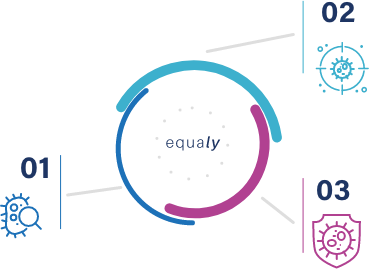Our Technology
Adaptive and innate immunity
The immune system is based on an intricate combination of cell types and biochemical reactions, protecting the body from disease. It consists of two parts: the innate and the adaptive immune system.
The innate immune system acts as the first line of defense for the body, working rapidly and with a broad approach. If it fails to immediately stop a threat, the adaptive immune system is triggered. This secondary system takes longer to activate, but targets pathogens more directly and provides long-lasting protection by building a memory. Despite their distinct functions, both systems are connected
and vital for the body’s defense.
Therapeutics typically target the adaptive immune system; despite its importance, the innate immune system has traditionally been perceived as non-specific, meaning interventions may risk leading to unwanted side effects.
We now know much more about the innate immune system and the specificity of some of its cells. As we unravel this new knowledge, its formerly overlooked potential in therapeutic applications is becoming clear.
Unlocking innate immunity
Equaly is the first company to unlock the therapeutic potential of the innate immune system. Our technology is based on the recent discovery that some cells belonging to this system, a subset of natural killer T cells (NKT cells), are antigen-specific for proteins. This type of specificity was not thought to exist in the innate immune system.
Following activation by a protein, the NKT cells multiply rapidly and modulate the response of other immune cells in both the innate and adaptive immune system. They influence the outcome of immune responses in a broad range of indications, including cancer, inflammation, autoimmune and infectious diseases.
By basing our technology on these insights, Equaly has opened up a myriad of potential new therapeutic applications.
Using Equaly’s platform
technology, it is possible to:
- Identify and predict motifs in target proteins that will activate NKT cells
- Produce peptides based on these sequences to regulate the immune response
- Engineer proteins to alter their immunogenicity (the protein’s ability to activate an immune response)
- Use the activation/memory of NKT cells as biomarkers for patient follow-up
Unique benefits
When developing therapies, Equaly’s platform provides the following benefits: